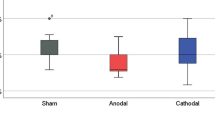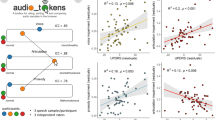Abstract
Hypokinetic dysarthria (HD) is a difficult-to-treat symptom affecting quality of life in patients with Parkinson’s disease (PD). Levodopa may partially alleviate some symptoms of HD in PD, but the neural correlates of these effects are not fully understood. The aim of our study was to identify neural mechanisms by which levodopa affects articulation and prosody in patients with PD. Altogether 20 PD patients participated in a task fMRI study (overt sentence reading). Using a single dose of levodopa after an overnight withdrawal of dopaminergic medication, levodopa-induced BOLD signal changes within the articulatory pathway (in regions of interest; ROIs) were studied. We also correlated levodopa-induced BOLD signal changes with the changes in acoustic parameters of speech. We observed no significant changes in acoustic parameters due to acute levodopa administration. After levodopa administration as compared to the OFF dopaminergic condition, patients showed task-induced BOLD signal decreases in the left ventral thalamus (p = 0.0033). The changes in thalamic activation were associated with changes in pitch variation (R = 0.67, p = 0.006), while the changes in caudate nucleus activation were related to changes in the second formant variability which evaluates precise articulation (R = 0.70, p = 0.003). The results are in line with the notion that levodopa does not have a major impact on HD in PD, but it may induce neural changes within the basal ganglia circuitries that are related to changes in speech prosody and articulation.



Similar content being viewed by others
Data availability
The datasets generated during and/or analyzed during the current study are available from the corresponding author on reasonable request.
References
Abutalebi J, Rosa PAD, Castro Gonzaga AK, Keim R, Costa A, Perani D (2013) The role of the left putamen in multilingual language production. Brain Lang 125:307–315. https://doi.org/10.1016/j.bandl.2012.03.009
Arnold C, Gehrig J, Gispert S, Seifried C, Kell CA (2014) Pathomechanisms and compensatory efforts related to Parkinsonian speech. NeuroImage Clin 4:82–97. https://doi.org/10.1016/j.nicl.2013.10.016
Berankova D, Janousova E, Mrackova M, Eliasova I, Kostalova M, Skutilova S, Rektorova I (2015) Addenbrooke’s cognitive examination and individual domain cut-off scores for discriminating between different cognitive subtypes of Parkinson’s disease. Parkinson Dis 2015:579417. https://doi.org/10.1155/2015/579417
Brabenec L, Mekyska J, Galaz Z, Rektorova I (2017) Speech disorders in Parkinson’s disease: early diagnostics and effects of medication and brain stimulation. J Neural Transm 124:303–334. https://doi.org/10.1007/s00702-017-1676-0
Brabenec L, Klobusiakova P, Barton M, Mekyska J, Galaz Z, Zvoncak V, Kiska T, Mucha J, Smekal Z, Kostalova M, Rektorova I (2019) Non-invasive stimulation of the auditory feedback area for improved articulation in Parkinson’s disease. Parkinsonism Relat Disord 61:187–192. https://doi.org/10.1016/j.parkreldis.2018.10.011
Brabenec L, Klobusiakova P, Simko P, Kostalova M, Mekyska J, Rektorova I (2021) Non-invasive brain stimulation for speech in Parkinson’s disease: a randomized controlled trial. Brain Stimul 14(3):571–578. https://doi.org/10.1016/j.brs.2021.03.010
Brown S, Laird AR, Pfordresher PQ, Thelen SM, Turkeltaub P, Liotti M (2009) The somatotopy of speech: phonation and articulation in the human motor cortex. Brain Cogn 70:31–41. https://doi.org/10.1016/j.bandc.2008.12.006
Cushnie-Sparrow D, Adams S, Abeyesekera A, Pieterman M, Gilmore G, Jog M (2018) Voice quality severity and responsiveness to levodopa in Parkinson’s disease. J Commun Disord 76:1–10. https://doi.org/10.1016/j.jcomdis.2018.07.003
Elfmarková N, Gajdoš M, Mračková M, Mekyska J, Mikl M, Rektorová I (2016) Impact of Parkinson’s disease and levodopa on resting state functional connectivity related to speech prosody control. Parkinsonism Relat Disord 22:S52–S55. https://doi.org/10.1016/j.parkreldis.2015.09.006
Fritsch M, Rangus I, Nolte CH (2022) Thalamic Aphasia: a review. Curr Neurol Neurosci Rep 22:855–865. https://doi.org/10.1007/s11910-022-01242-2
Frota S, Cruz M, Cardoso R, Guimarães I, Ferreira JJ, Pinto S, Vigário M (2021) (Dys)Prosody in Parkinson’s disease: effects of medication and disease duration on intonation and prosodic phrasing. Brain Sci. https://doi.org/10.3390/brainsci11081100
Gago MF, Garrett MC, Fonseca MR, Rosas MJ, Simões MF, Vieira S, Botelho F (2009) How do cognitive and axial motor signs correlate in Parkinson’s disease? A 6-year prospective study. J Neurol 256:1655–1662. https://doi.org/10.1007/s00415-009-5174-7
Goberman AM, Blomgren M (2003) Parkinsonian speech disfluencies: effects of l-dopa-related fluctuations. J Fluen Disord 28:55–70. https://doi.org/10.1016/S0094-730X(03)00005-6
Gómez-Vilda P, Mekyska J, Ferrández JM, Palacios-Alonso D, Gómez-Rodellar A, Rodellar-Biarge V, Galaz Z, Smekal Z, Eliasova I, Kostalova M, Rektorova I (2017) Parkinson disease detection from speech articulation neuromechanics. Front Neuroinform. https://doi.org/10.3389/fninf.2017.00056
Jacquemot C, Bachoud-Lévi A-C (2021) Striatum and language processing: where do we stand? Spec Issue Honour Jacques Mehler Cogn Found Ed 213:104785. https://doi.org/10.1016/j.cognition.2021.104785
Klobusiakova P, Mekyska J, Brabenec L, Galaz Z, Zvoncak V, Mucha J, Rapcsak SZ, Rektorova I (2021) Articulatory network reorganization in Parkinson’s disease as assessed by multimodal MRI and acoustic measures. Parkinsonism Relat Disord 84:122–128. https://doi.org/10.1016/j.parkreldis.2021.02.012
Klostermann F, Ehlen F (2013) Functional roles of the thalamus for language capacities. Front Syst Neurosci. https://doi.org/10.3389/fnsys.2013.00032
Košálová M, Mráčková M, Mareček R, Beránková D, Eliášová I, Koritakova E, Roubíčková J, Bednarik J, Rektorové I (2013) The 3F test dysarthric profile—normative speach values in Czech. Ceska Slov Neurol Neurochir 76:614–618
Kulisevsky J, García-Sánchez C, Berthier ML, Barbanoj M, Pascual-Sedano B, Gironell A, Estévez-González A (2000) Chronic effects of dopaminergic replacement on cognitive function in Parkinson’s disease: a two-year follow-up study of previously untreated patients. Mov Disord 15:613–626. https://doi.org/10.1002/1531-8257(200007)15:4%3c613::AID-MDS1005%3e3.0.CO;2-F
Liotti M, Ramig LO, Vogel D (2003) Hypophonia in Parkinson’s disease: neural correlates of voice treatment revealed by PET. Neurology 60:432–440
Maillet A, Krainik A, Debû B, Troprès I, Lagrange C, Thobois S, Pollak P, Pinto S (2012) Levodopa effects on hand and speech movements in patients with Parkinson’s disease: a FMRI study. PLoS One 7:e46541–e46541. https://doi.org/10.1371/journal.pone.0046541
Manes JL, Tjaden K, Parrish T, Simuni T, Roberts A, Greenlee JD, Corcos DM, Kurani AS (2018) Altered resting-state functional connectivity of the putamen and internal globus pallidus is related to speech impairment in Parkinson’s disease. Brain Behav 8(9):e01073. https://doi.org/10.1002/brb3.1073
Mekyska J, Janousova E, Gomez-Vilda P, Smekal Z, Rektorova I, Eliasova I, Kostalova M, Mrackova M, Alonso-Hernandez JB, Faundez-Zanuy M, López-de-Ipiña K (2015) Robust and complex approach of pathological speech signal analysis. Neurocomputing 167:94–111. https://doi.org/10.1016/j.neucom.2015.02.085
Murphy E, Hoshi K, Benítez-Burraco A (2022) Subcortical syntax: reconsidering the neural dynamics of language. J Neurolinguist 62:101062. https://doi.org/10.1016/j.jneuroling.2022.101062
New AB, Robin DA, Parkinson AL, Eickhoff CR, Reetz K, Hoffstaedter F, Mathys C, Sudmeyer M, Michely J, Caspers J, Grefkes C, Larson CR, Ramig LO, Fox PT, Eickhoff SB (2015) The intrinsic resting state voice network in Parkinson’s disease. Hum Brain Mapp 36:1951–1962. https://doi.org/10.1002/hbm.22748
Nieoullon A (2002) Dopamine and the regulation of cognition and attention. Prog Neurobiol 67:53–83. https://doi.org/10.1016/S0301-0082(02)00011-4
Nutt JG, Carter JH, Van Houten L, Woodward WR (1997) Short- and long-duration responses to levodopa during the first year of levodopa therapy. Ann Neurol 42:349–355. https://doi.org/10.1002/ana.410420311
Pichon S, Kell CA (2013) Affective and sensorimotor components of emotional prosody generation. J Neurosci 33:1640. https://doi.org/10.1523/JNEUROSCI.3530-12.2013
Rektorová I (2010) Effects of dopamine agonists on neuropsychiatric symptoms of Parkinson’s disease. Neurodegener Dis 7:206–209. https://doi.org/10.1159/000295665
Rektorová I, Rektor I, Bareš M, Dostál V, Ehler E, Fanfrdlová Z, Fiedler J, Klajblová H, Kulišt’ák P, Ressner P, Svátová J, Urbánek K, Velísková J (2005) Cognitive performance in people with Parkinson’s disease and mild or moderate depression: effects of dopamine agonists in an add-on to l-dopa therapy. Eur J Neurol 12:9–15. https://doi.org/10.1111/j.1468-1331.2004.00966.x
Rektorova I, Barrett J, Mikl M, Rektor I, Paus T (2007) Functional abnormalities in the primary orofacial sensorimotor cortex during speech in Parkinson’s disease. Mov Disord 22:2043–2051. https://doi.org/10.1002/mds.21548
Rektorova I, Mekyska J, Janousova E, Kostalova M, Eliasova I, Mrackova M, Berankova D, Necasova T, Smekal Z, Marecek R (2016) Speech prosody impairment predicts cognitive decline in Parkinson’s disease. Parkinsonism Relat Disord 29:90–95. https://doi.org/10.1016/j.parkreldis.2016.05.018
Rusz J, Tykalová T, Klempíř J, Čmejla R, Růžička E (2016) Effects of dopaminergic replacement therapy on motor speech disorders in Parkinson’s disease: longitudinal follow-up study on previously untreated patients. J Neural Transm 123:379–387. https://doi.org/10.1007/s00702-016-1515-8
Rusz J, Tykalova T, Novotny M, Zogala D, Sonka K, Ruzicka E, Dusek P (2021) Defining speech subtypes in de novo Parkinson disease. Neurology 97:e2124. https://doi.org/10.1212/WNL.0000000000012878
Rusz J, Tykalová T, Novotný M, Zogala D, Růžička E, Dušek P (2022) Automated speech analysis in early untreated Parkinson’s disease: Relation to gender and dopaminergic transporter imaging. Eur J Neurol 29:81–90. https://doi.org/10.1111/ene.15099
Skodda S, Visser W, Schlegel U (2010) Short- and long-term dopaminergic effects on dysarthria in early Parkinson’s disease. J Neural Transm 117:197–205. https://doi.org/10.1007/s00702-009-0351-5
Steurer H, Schalling E, Franzén E, Albrecht F (2022) Characterization of mild and moderate dysarthria in Parkinson’s disease: behavioral measures and neural correlates. Front Aging Neurosci. https://doi.org/10.3389/fnagi.2022.870998
Tomlinson CL, Stowe R, Patel S, Rick C, Gray R, Clarke CE (2010) Systematic review of levodopa dose equivalency reporting in Parkinson’s disease. Mov Disord 25:2649–2653. https://doi.org/10.1002/mds.23429
Tremblay P, Dick AS (2016) Broca and Wernicke are dead, or moving past the classic model of language neurobiology. Brain Lang 162:60–71. https://doi.org/10.1016/j.bandl.2016.08.004
Tykalova T, Novotny M, Ruzicka E, Dusek P, Rusz J (2022) Short-term effect of dopaminergic medication on speech in early-stage Parkinson’s disease. Npj Parkinson Dis 8:22. https://doi.org/10.1038/s41531-022-00286-y
Wahl M, Marzinzik F, Friederici AD, Hahne A, Kupsch A, Schneider G-H, Saddy D, Curio G, Klostermann F (2008) The human thalamus processes syntactic and semantic language violations. Neuron 59:695–707. https://doi.org/10.1016/j.neuron.2008.07.011
Ziegler W, Ackermann H (2013) Neuromotor speech impairment: it’s all in the talking. Folia Phoniatr Logop 65:55–67. https://doi.org/10.1159/000353855
Acknowledgements
This work was supported by project nr. LX22NPO5107 (MEYS): Financed by European Union-Next Generation EU.
Author information
Authors and Affiliations
Corresponding author
Ethics declarations
Conflict of interest
I declare that all authors have read and contributed substantially to the manuscript, the paper has not been previously published, and it is not under simultaneous consideration by another journal. I declare no ghost writing by anyone not named on the author list. I disclose that none of the authors has conflicts of interest and commercial relationships including grants, honoraria, speaker’s lists, significant ownership, and/or support from pharmaceutical or other companies.
Additional information
Publisher's Note
Springer Nature remains neutral with regard to jurisdictional claims in published maps and institutional affiliations.
Supplementary Information
Below is the link to the electronic supplementary material.
Rights and permissions
Springer Nature or its licensor (e.g. a society or other partner) holds exclusive rights to this article under a publishing agreement with the author(s) or other rightsholder(s); author self-archiving of the accepted manuscript version of this article is solely governed by the terms of such publishing agreement and applicable law.
About this article
Cite this article
Mračková, M., Mareček, R., Mekyska, J. et al. Levodopa may modulate specific speech impairment in Parkinson's disease: an fMRI study. J Neural Transm 131, 181–187 (2024). https://doi.org/10.1007/s00702-023-02715-5
Received:
Accepted:
Published:
Issue Date:
DOI: https://doi.org/10.1007/s00702-023-02715-5




